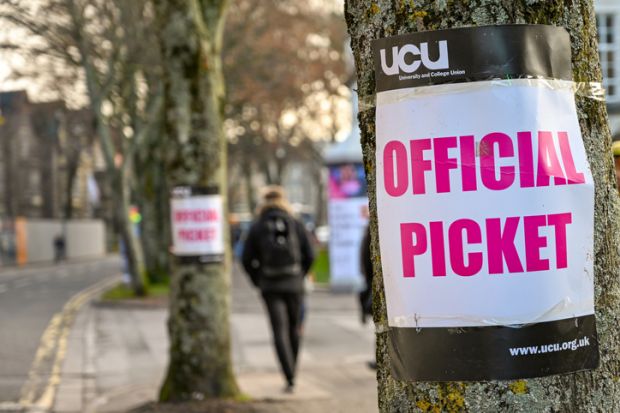University and College Union members are set to strike for three days at the end of November in the long-running disputes over pay, pensions and working conditions.
The action – announced after a meeting of the union’s higher education committee – follows the vote in favour of cross-sector walkouts in ballot results announced last month.
The exact dates of the November strikes are due to be published next week. More than 70,000 staff at 150 universities are eligible to join the picket lines, meaning disruption could affect millions of students’ education.
Jo Grady, the union’s general secretary, said the higher education committee had also agreed to launch a marking boycott at the start of 2023 and to “escalate” industrial action from February if a settlement cannot be reached.
“There is a small window now for employers to get serious – a small window for your vice-chancellor to avoid action on campus,” Dr Grady said in a video posted on Twitter. “I hope they take it, but if not, we’ve all got to get ready to take action in our sector and along with other unions in the movement.”
In response to the strike vote, the Universities and Colleges Employers Association said it was consulting on the possibility of bringing forward the 2023-24 pay negotiations in response to concerns over the cost of living.
The UCU is also seeking the reversal of cuts to pensions provided by the Universities Superannuation Scheme and action on issues such as workloads, casualisation and workplace inequalities.
The higher education committee’s decision is largely in line with the views expressed by union branches, which said initial strike action should be limited in scale and should grow in seriousness over the six-month mandate delivered by the “yes” vote.
The recent ballot was the first time in recent years that the UCU ran an aggregated ballot, meaning that all universities now face disruption as opposed to the patchier action delivered by branch-by-branch polls that saw just 39 institutions affected last time around.
The union comfortably passed the 50 per cent turnout threshold – needed under trade union laws introduced in 2016 – and more than eight in 10 of those polled supported walking out.
Raj Jethwa, Ucea’s chief executive, said universities “fully recognise the inflationary pressures currently facing staff”.
“While Ucea is not proposing to reopen the 2022-23 pay round, which our member HE institutions have consistently confirmed as fully concluded, we are consulting on the possibility of bringing forward the…2023-24 pay negotiations…It is, therefore, disappointing that UCU’s HEC is proposing yet another bout of strike action which might only damage students and staff,” he said.
“We would urge UCU to provide its members with a realistic and fair assessment of what is achievable before encouraging strike action.”
Speaking previously, a Universities UK spokeswoman said: “We understand that the ballot results may leave students concerned about the impact that potential industrial action could have on their degrees. Universities are adept at mitigating the impact of strikes on student learning, and so prepared for any further possible industrial action over the coming months.”
